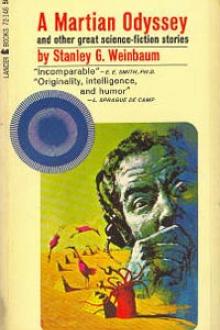Short Fiction - Stanley G. Weinbaum (e book reader pdf .TXT) 📗

- Author: Stanley G. Weinbaum
Book online «Short Fiction - Stanley G. Weinbaum (e book reader pdf .TXT) 📗». Author Stanley G. Weinbaum
“The city was in ruin! Abandoned, deserted, dead as Babylon! Or at least, so it looked to us then, with its empty streets which, if they had been paved, were now deep under sand.”
“A ruin, eh?” commented Harrison. “How old?”
“How could we tell?” countered Jarvis. “The next expedition to this golf ball ought to carry an archeologist—and a philologist, too, as we found out later. But it’s a devil of a job to estimate the age of anything here; things weather so slowly that most of the buildings might have been put up yesterday. No rainfall, no earthquakes, no vegetation is here to spread cracks with its roots—nothing. The only aging factors here are the erosion of the wind—and that’s negligible in this atmosphere—and the cracks caused by changing temperature. And one other agent—meteorites. They must crash down occasionally on the city, judging from the thinness of the air, and the fact that we’ve seen four strike ground right here near the Ares.”
“Seven,” corrected the captain. “Three dropped while you were gone.”
“Well, damage by meteorites must be slow, anyway. Big ones would be as rare here as on earth, because big ones get through in spite of the atmosphere, and those buildings could sustain a lot of little ones. My guess at the city’s age—and it may be wrong by a big percentage—would be fifteen thousand years. Even that’s thousands of years older than any human civilization; fifteen thousand years ago was the Late Stone Age in the history of mankind.
“So Leroy and I crept up to those tremendous buildings feeling like pygmies, sort of awestruck, and talking in whispers. I tell you, it was ghostly walking down that dead and deserted street, and every time we passed through a shadow, we shivered, and not just because shadows are cold on Mars. We felt like intruders, as if the great race that had built the place might resent our presence even across a hundred and fifty centuries. The place was as quiet as a grave, but we kept imagining things and peeping down the dark lanes between buildings and looking over our shoulders. Most of the structures were windowless, but when we did see an opening in those vast walls, we couldn’t look away, expecting to see some horror peering out of it.
“Then we passed an edifice with an open arch; the doors were there, but blocked open by sand. I got up nerve enough to take a look inside, and then, of course, we discovered we’d forgotten to take our flashes. But we eased a few feet into the darkness and the passage debouched into a colossal hall. Far above us a little crack let in a pallid ray of daylight, not nearly enough to light the place; I couldn’t even see if the hall rose clear to the distant roof. But I know the place was enormous; I said something to Leroy and a million thin echoes came slipping back to us out of the darkness. And after that, we began to hear other sounds—slithering rustling noises, and whispers, and sounds like suppressed breathing—and something black and silent passed between us and that faraway crevice of light.
“Then we saw three little greenish spots of luminosity in the dusk to our left. We stood staring at them, and suddenly they all shifted at once. Leroy yelled ‘Ce sont des yeux!’ and they were! They were eyes!
“Well, we stood frozen for a moment, while Leroy’s yell reverberated back and forth between the distant walls, and the echoes repeated the words in queer, thin voices. There were mumblings and mutterings and whisperings and sounds like strange soft laughter, and then the three-eyed thing moved again. Then we broke for the door!
“We felt better out in the sunlight; we looked at each other sheepishly, but neither of us suggested another look at the buildings inside—though we did see the place later, and that was queer, too—but you’ll hear about it when I come to it. We just loosened our revolvers and crept on along that ghostly street.
“The street curved and twisted and subdivided. I kept careful note of our directions, since we couldn’t risk getting lost in that gigantic maze. Without our thermo-skin bags, night would finish us, even if what lurked in the ruins didn’t. By and by, I noticed that we were veering back toward the canal, the buildings ended and there were only a few dozen ragged stone huts which looked as though they might have been built of debris from the city. I was just beginning to feel a bit disappointed at finding no trace of Tweel’s people here when we rounded a corner and there he was!
“I yelled ‘Tweel!’ but he just stared, and then I realized that he wasn’t Tweel, but another Martian of his sort. Tweel’s feathery appendages were more orange hued and he stood several inches taller than this one. Leroy was sputtering in excitement, and the Martian kept his vicious beak directed at us, so I stepped forward as peacemaker. I said ‘Tweel?’ very questioningly, but there was no result. I tried it a dozen times, and we finally had to give it up; we couldn’t connect.
“Leroy and I walked toward the huts, and the Martian followed us. Twice he was joined by others, and each time I tried yelling ‘Tweel’ at them but they just stared at us. So we ambled on with the three trailing us, and then it suddenly occurred to me that my Martian accent might be at fault. I faced the group and tried trilling it out the way Tweel himself did: ‘T-r-r-rwee-r-rl!’ Like that.
“And that worked! One of them





Comments (0)